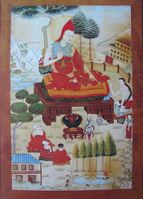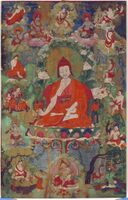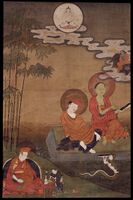Āryadeva: Difference between revisions
No edit summary |
No edit summary |
||
| Line 8: | Line 8: | ||
|MainNameSkt=Āryadeva | |MainNameSkt=Āryadeva | ||
|bio=Āryadeva (3rd century), a disciple of Nāgārjuna, is a central figure in the development of early Indian Madhyamaka philosophy. Āryadeva’s Hundred Verses Treatise (Bai lun) was one of the three basic texts of the Chinese Madhyamaka school founded by the central Asian monk Kumārajīva (b. 344–d. 413), which accordingly was called the Sanlun (Jpn. Sanron), or “three-treatise” school. According to the biography that Kumārajīva translated into Chinese, Āryadeva was born into a South Indian Brahmin family, became Nāgārjuna’s disciple, was renowned for his skill in debate, and was murdered by a student of a defeated teacher. Candrakīrti (b. c. 570–d. 650), in his commentary on Āryadeva’s major work, the Four Hundred Verses (Catuḥśataka), reports that Āryadeva was born on the island of Sinhala (Sri Lanka) as a king’s son, renounced his royal status, became a monk, and traveled to South India, where he studied with Nāgārjuna. Some scholars suggest that Āryadeva is the elder deva mentioned in the Mahāvaṃsa and Dīpavaṃsa chronicles of early Sri Lankan religious history. Āryadeva did not write commentaries on Nāgārjuna’s works but, rather, wrote autonomous treatises that defended Madhyamaka beliefs against its Buddhist and non-Buddhist critics. He devotes the first eight chapters to explaining ethical behavior and such practices as generosity, which form the basis for the bodhisattva’s accumulation of merit (puṇya). The latter eight chapters refute wrong views about the independent existence of external phenomena and the self, defending the Madhyamaka philosophy of emptiness and the dependently arisen nature of all things. The Catuḥśataka presents the path to the attainment of buddhahood as structured around these two requisites of merit and knowledge (jñāna). As an introduction to the practices of a bodhisattva, the Catuḥśataka prepares the ground for Śāntideva’s later (c. 8th-century) and more extensive treatment in Introduction to the Practices of a Bodhisattva (Bodhicaryāvatāra). Apart from some fragments of the Catuḥśataka, none of the works the Chinese and Tibetan canons attributed to Āryadeva survive in Sanskrit. [https://www.oxfordbibliographies.com/view/document/obo-9780195393521/obo-9780195393521-0065.xml From Oxford Bibliogrpahies ] | |bio=Āryadeva (3rd century), a disciple of Nāgārjuna, is a central figure in the development of early Indian Madhyamaka philosophy. Āryadeva’s Hundred Verses Treatise (Bai lun) was one of the three basic texts of the Chinese Madhyamaka school founded by the central Asian monk Kumārajīva (b. 344–d. 413), which accordingly was called the Sanlun (Jpn. Sanron), or “three-treatise” school. According to the biography that Kumārajīva translated into Chinese, Āryadeva was born into a South Indian Brahmin family, became Nāgārjuna’s disciple, was renowned for his skill in debate, and was murdered by a student of a defeated teacher. Candrakīrti (b. c. 570–d. 650), in his commentary on Āryadeva’s major work, the Four Hundred Verses (Catuḥśataka), reports that Āryadeva was born on the island of Sinhala (Sri Lanka) as a king’s son, renounced his royal status, became a monk, and traveled to South India, where he studied with Nāgārjuna. Some scholars suggest that Āryadeva is the elder deva mentioned in the Mahāvaṃsa and Dīpavaṃsa chronicles of early Sri Lankan religious history. Āryadeva did not write commentaries on Nāgārjuna’s works but, rather, wrote autonomous treatises that defended Madhyamaka beliefs against its Buddhist and non-Buddhist critics. He devotes the first eight chapters to explaining ethical behavior and such practices as generosity, which form the basis for the bodhisattva’s accumulation of merit (puṇya). The latter eight chapters refute wrong views about the independent existence of external phenomena and the self, defending the Madhyamaka philosophy of emptiness and the dependently arisen nature of all things. The Catuḥśataka presents the path to the attainment of buddhahood as structured around these two requisites of merit and knowledge (jñāna). As an introduction to the practices of a bodhisattva, the Catuḥśataka prepares the ground for Śāntideva’s later (c. 8th-century) and more extensive treatment in Introduction to the Practices of a Bodhisattva (Bodhicaryāvatāra). Apart from some fragments of the Catuḥśataka, none of the works the Chinese and Tibetan canons attributed to Āryadeva survive in Sanskrit. [https://www.oxfordbibliographies.com/view/document/obo-9780195393521/obo-9780195393521-0065.xml From Oxford Bibliogrpahies ] | ||
[https://www.academia.edu/39006061/%C4%80ryadeva_full_version_ See Tillemans article on Āryadeva] appearing in the Routledge Handbook of Indian Buddhist Philosophy. | |||
|PersonType=Classical Indian Authors | |PersonType=Classical Indian Authors | ||
|images=File:Aryadeva_2-HAR.jpg | |images=File:Aryadeva_2-HAR.jpg | ||
Revision as of 15:22, 10 December 2021
| PersonType | Category:Classical Indian Authors |
|---|---|
| MainNamePhon | Āryadeva |
| MainNameTib | འཕགས་པ་ལྷ་ |
| MainNameWylie | 'phags pa lha |
| MainNameSkt | Āryadeva |
| SortName | Āryadeva |
| bio | Āryadeva (3rd century), a disciple of Nāgārjuna, is a central figure in the development of early Indian Madhyamaka philosophy. Āryadeva’s Hundred Verses Treatise (Bai lun) was one of the three basic texts of the Chinese Madhyamaka school founded by the central Asian monk Kumārajīva (b. 344–d. 413), which accordingly was called the Sanlun (Jpn. Sanron), or “three-treatise” school. According to the biography that Kumārajīva translated into Chinese, Āryadeva was born into a South Indian Brahmin family, became Nāgārjuna’s disciple, was renowned for his skill in debate, and was murdered by a student of a defeated teacher. Candrakīrti (b. c. 570–d. 650), in his commentary on Āryadeva’s major work, the Four Hundred Verses (Catuḥśataka), reports that Āryadeva was born on the island of Sinhala (Sri Lanka) as a king’s son, renounced his royal status, became a monk, and traveled to South India, where he studied with Nāgārjuna. Some scholars suggest that Āryadeva is the elder deva mentioned in the Mahāvaṃsa and Dīpavaṃsa chronicles of early Sri Lankan religious history. Āryadeva did not write commentaries on Nāgārjuna’s works but, rather, wrote autonomous treatises that defended Madhyamaka beliefs against its Buddhist and non-Buddhist critics. He devotes the first eight chapters to explaining ethical behavior and such practices as generosity, which form the basis for the bodhisattva’s accumulation of merit (puṇya). The latter eight chapters refute wrong views about the independent existence of external phenomena and the self, defending the Madhyamaka philosophy of emptiness and the dependently arisen nature of all things. The Catuḥśataka presents the path to the attainment of buddhahood as structured around these two requisites of merit and knowledge (jñāna). As an introduction to the practices of a bodhisattva, the Catuḥśataka prepares the ground for Śāntideva’s later (c. 8th-century) and more extensive treatment in Introduction to the Practices of a Bodhisattva (Bodhicaryāvatāra). Apart from some fragments of the Catuḥśataka, none of the works the Chinese and Tibetan canons attributed to Āryadeva survive in Sanskrit. From Oxford Bibliogrpahies
See Tillemans article on Āryadeva appearing in the Routledge Handbook of Indian Buddhist Philosophy. |
| IsInGyatsa | No |
| Other wikis |
If the page does not yet exist on the remote wiki, you can paste the tag |
Tibetan Names
Sanskrit Names
Dates
Writings
From : http://web.otani.ac.jp/cri/twrp/tibdate/Peking_online_search.html
Search Words: Aryadeva
rnal 'byor gyi rgyud dpal gdan bzhi pa'i sgrub thabs / (zrIcatuHpIThayogatantrasAdhanopAyikA.)
- [A] Aryadeva., [Tr] kamalagupta., [Tr] rin chen bzang po / (ratnabhadra.)
- [P. No.] 2481, rgyud 'grel, 'a 91a4-101a8 (vol.57, p.204)
- [D. No.] 1610, , ya 73b5-82a4. [N] 'a 81a2-90a4. [Kinsha] 485, 'a 105b1 (p.53-4-1)
ye shes dbang phyug ma'i sgrub thabs / (jJAnezvarIsAdhana.)
- [A] 'phags pa lha / (Aryadeva.), [Tr] smRtijAnakIrti.
- [P. No.] 2483, rgyud 'grel, 'a 129a7-141b8 (vol.57, p.219)
- [D. No.] 1612, , ya 103b6-113a3. [N] 'a 114a5-125a1. [Kinsha] 487, 'a 154b1 (p.79-1-1)
rgyud kyi rgyal po dpal gdan bzhi pa zhes bya ba'i dkyil 'khor gyi cho ga snying po mdor bsags pa zhes bya ba / (zrIcatuHpIThatantrarAja(-nAma-)maNDalopAyikAvidhisArasamuccayanAma.)
- [A] Aryadeva., [Tr] lhas btsas / (devasUta.), [Tr] gayadhara.
- [P. No.] 2484, rgyud 'grel, 'a 142a1-172b8 (vol.57, p.225)
- [D. No.] 1613, , ya 113a4-138a1. [N] 'a 125a1-153b3. [Kinsha] 488, 'a 167b1 (p.85-2-1)
(dpal gdan bzhi'i zab don ston pa shing gcig gi dka' 'grel / ) ([zrIcatuHpIThagUDhArthanirdeza-ekadrumapaJjikA.])
- [A] 'phags pa lha / (Aryadeva.)
- [P. No.] 2485, rgyud 'grel, 'a 173a1-177b6 (vol.57, p.237)
- [D. No.] 1614, , ya 138a1-142a3. [N] 'a 153b3-158a7. [Kinsha] 489, 'a 201b1 (p.101-4-1)
rdo rje dril thabs kyi mchod pa'i thabs kyi rim pa / (vajraghaNTapUjAsAdhanakrama.)
- [A] 'phags pa lha / (Aryadeva.)
- [P. No.] 2486, rgyud 'grel, 'a 177b6-179a5 (vol.57, p.239)
- [D. No.] 1615, , ya 142a3-143a7. [N] 'a 158a7-159b5. [Kinsha] 490, 'a 207b1 (p.105-2-1)
sgron ma gsal bar byed pa zhes bya ba'i 'grel bshad / (pradIpoddyotana-nAma-TIkA.)
- [A] Aryadeva.
- [P. No.] 2659, rgyud 'grel, ki 1b1-61b5 (vol.61, p.61)
- [D. No.] 1794, , khi 155a6-205a7. [N] ki 1b1-57b5. [Kinsha] 662, ki 1b1 (p.1-2-1)
spyod pa bsdus pa'i sgron ma / (caryAmelApakapradIpa.)
- [A] Aryadeva., [Tr] rin chen bzang po / (ratnabhadra.), [Tr] zraddhAkaravarma.
- [P. No.] 2668, rgyud 'grel, gi 64a1-121b3 (vol.61, p.293)
- [D. No.] 1803, , ngi 57a2-106b7. [N] gi 62b2-118b5. [Kinsha] 671, gi 84b1 (p.43-3-1)
sems kyi sgrib pa rnam par sbyong ba zhes bya ba'i rab tu byed pa / (cittAvaraNavizodhana-nAma-prakaraNa.)
- [A] Aryadeva., [Tr] tshul khrims rgyal ba / (jayazIla.), [Tr] jAnAkara.
- [P. No.] 2669, rgyud 'grel, gi 121b3-127a8 (vol.62, p.1)
- [D. No.] 1804, , ngi 106b7-112a3. [N] gi 118b5-124b2. [Kinsha] 672, gi 154b1 (p.79-1-1)
bdag byin gyis brlab pa'i rim pa rnam par dbye ba / (svAdhiSThAnakramaprabheda.)
- [A] Aryadeva.
- [P. No.] 2670, rgyud 'grel, gi 127a8-130a4 (vol.62, p.3)
- [D. No.] 1805, , ngi 112a3-114b1. [N] gi 124b2-127a7. [Kinsha] 673, gi 162b1 (p.83-1-1)
mngon par byang chub pa'i rim pa'i man ngag (abhibodhikramopadeza.)
- [A] 'phags pa lha / (Aryadeva.), [Tr] rin chen bzang po / (ratnabhadra.), [Tr] zraddhAkaravarma.
- [P. No.] 2671, rgyud 'grel, gi 130a4-132b8 (vol.62, p.4)
- [D. No.] 1806, , ngi 114b2-117a2. [N] gi 127a7-130a6. [Kinsha] 674, gi 165b5 (p.83-4-5)
ro bsreg pa'i cho ga (marahomavidhi.)
- [A] 'phags pa lha / (Aryadeva.), [Tr] rin chen bzang po / (ratnabhadra.), [Tr] zraddhAkaravarma.
- [P. No.] 2672, rgyud 'grel, gi 132b8-134b3 (vol.62, p.5)
- [D. No.] 1807, , ngi 117a2-118b1. [N] gi 130a6-132a2. [Kinsha] 675, gi 169a5 (p.84-4-5)
dpal gsang ba 'dus pa'i rdzogs rim mthar phyin pa / ([zrIguhyasamAjaniSpannakramAntaka.])
- [A] Aryadeva.
- [P. No.] 2673, rgyud 'grel, gi 134b3-137b6 (vol.62, p.6)
- [D. No.] 1808, , ngi 118b1-121a6. [N] gi 132a3-135a6. [Kinsha] 676, gi 171a5 (p.86-2-5)
rnam par mi rtog pa'i rab tu byed pa / (nirvikalpaprakaraNa.)
- [A] Aryadeva., [Tr] rma ban chos 'bar / (dharmajvAla.), [Tr] mahAkaruNa.
- [P. No.] 3126, rgyud 'grel, tsi 146a8-147a4 (vol.69, p.130)
- [D. No.] 2279, , zhi 133a4-134a1. [N] tsi 134b4-135a7. [Kinsha] 1130, tsi 187b1 (p.95-3-1)
dug lnga sbas pa'i lam mchog tu gsang ba bsam gyis mi khyab pa zhes bya ba / ([atiguhyAcintya-nAma-paJcaviSaguptamArga.])
- [A] 'phags pa lha / (Aryadeva.)
- [P. No.] 3285, rgyud 'grel, tshi 162b6-166b1 (vol.69, p.255)
- [D. No.] 2457, , zi 129b5-132b5. [N] tshi 141a5-144b3. [Kinsha] 1289, tshi 195b6 (p.99-2-6)
bcom ldan 'das 'jam pa'i dbyangs kyi dpyad / ([bhagavanmaJjughoSa-vicAraNa.])
- [A] 'phags pa'i lha / (Aryadeva.)
- [P. No.] 3526, rgyud 'grel, nyu 85a7-88b8 (vol.79, p.80)
- [D. No.] -. [N] nyu 114b2-118b3. [Kinsha] 1532, nyu 155b6 (p.79-2-6)
go bar byed pa snying po brgya pa / (pratipattisArazataka.)
- [A] Aryadeva., [Tr] bsod nams rnam par rgyal ba dbang po'i sde / (puNyavijayendrasena.), [Tr] nags kyi rin po che / (vanaratna.)
- [P. No.] 4695, rgyud 'grel, phu 152a8-157b6 (vol.82, p.165167)
- [D. No.] 2334, , zhi 278b1-283a2. [N] phu 149b5-154b3. [Kinsha] 2694, phu 207b1 (p.105-2-1)
bdag med ma lha mo bco lnga la bstod pa / (nairAtmApaJcadazadevIstotra.)
- [A] 'phags pa lha / (Aryadeva.)
- [P. No.] 4707, rgyud 'grel, phu 211a7-212b4 (vol.82, p.188189)
[D. No.] -. [N] phu 203b1-204b3. [Kinsha] 2706, phu 280b1 (p.141-4-1) khro bo reg tshig gi bsgrub pa'i thabs zhes bya ba / (krodhabhayanAzanIsAdhana-nAma.)
- [A] aryadheva (Aryadeva)., [Tr] rdo rje gdan pa / (vajrAsana.), [Tr] ba ri /
- [P. No.] 5005, rgyud 'grel, 'u 123b4-128a2 (vol.86, p.221-223)
- [D. No.] -. [N] 'u 115b5-119b3. [Kinsha] 3004, 'u 161b1 (p.81-4-1)
reg 'bigs ma'i bsgrub thabs / (bhayazUlinIsAdhana.)
- [A] aryadheva (Aryadeva).
- [P. No.] 5006, rgyud 'grel, 'u 128a2-128b8 (vol.86, p.223)
- [D. No.] -. [N] 'u 119b3-120a7. [Kinsha] 3005, 'u 166a4 (p.84-1-4)
skal 'jog dbang gi cho ga (pralayAbhiSekavidhi.)
- [A] aryadheva (Aryadeva).
- [P. No.] 5007, rgyud 'grel, 'u 129a1-130b2 (vol.86, p.223-224)
- [D. No.] -. [N] 'u 120b1-121b6. [Kinsha] 3006, 'u 167a3 (p.84-2-3)
khro bo reg tshig gi dam tshig gsang ba'i bsgrub thabs / (krodhabhayanAzanIsamayaguhyasAdhana.)
- [A] aryadheva (Aryadeva)., [Tr] rdo rje gdan pa / (vajrAsana.), [Tr] ba ri /
- [P. No.] 5008, rgyud 'grel, 'u 130b2-131b4 (vol.86, p.224)
- [D. No.] -. [N] 'u 121b6-122b7. [Kinsha] 3007, 'u 168b6 (p.85-3-6)
khro bo reg tshig gi sbyin sreg gi cho ga zhes bya ba / (krodhabhayanAzanIhomavidhi-nAma.)
- [A] aryadheva (Aryadeva).
- [P. No.] 5009, rgyud 'grel, 'u 131b4-133a2 (vol.86, p.224-225)
- [D. No.] -. [N] 'u 122b7-124a5. [Kinsha] 3008, 'u 170a3 (p.86-1-3)
lha chen po gsum gyi bsgrub thabs / (mahAdevatrayasAdhana.)
- [A] aryadheva (Aryadeva).
- [P. No.] 5011, rgyud 'grel, 'u 133b5-134a7 (vol.86, p.225)
- [D. No.] -. [N] 'u 124b7-125b1. [Kinsha] 3010, 'u 172b2 (p.87-3-2)
cha shas kyi yan lag ces bya ba'i rab tu byed pa / (hastavAla-nAma-prakaraNa.)
- [A] 'phags pa lha / (Aryadeva.), [Tr] zraddhakaravarma (zraddhAkaravarman)., [Tr] rin chen bzang po /
- [P. No.] 5244, dbu ma, tsa 319a5-319b3 (vol.95, p.129-130)
- [D. No.] 3844, mdo 'grel, tsa 282b3-282b7. [N] tsa 312b2-313a1. [Kinsha] 3243, tsa 436b6 (p.219-3-6)
cha shas kyi yan lag ces bya ba'i rab tu byed pa'i 'grel pa / (hastavAla-nAma-prakaraNavRtti.)
- [A] 'phags pa lha / (Aryadeva.), [Tr] zraddhakaravarma (zraddhAkaravarman)., [Tr] rin chen bzang po /
- [P. No.] 5245, dbu ma, tsa 319b3-321a8 (vol.95, p.130)
- [D. No.] 3845, mdo 'grel, tsa 282b7-284a7. [N] tsa 313a1-315a5. [Kinsha] 3244, tsa 437a6 (p.218-4-6)
bstan bcos bzhi brgya pa zhes bya ba'i tshig le'ur byas pa / (catuHzatakazAstra-nAma-kArikA.)
- [A] 'phags pa lha / (Aryadeva.), [Tr] susmajAna (sUkSmajana)., [Tr] nyi ma grags /
- [P. No.] 5246, dbu ma, tsha 1a1-20a5 (vol.95, p.131-140)
- [D. No.] 3846, mdo 'grel, tsha 1a1-18a7. [N] tsha 1a1-18a7. [Kinsha] 3245, tsha 1b1 (p.1-2-1)
'khrul pa bzlog pa'i rigs pa gtan tshigs grub pa zhes bya ba / (skhalitapramathanayuktihetusiddhi-nAma.)
- [A] 'phags pa lha / (Aryadeva.), [Tr] sarvajaadeva., [Tr] dpal brtsegs /
- [P. No.] 5247, dbu ma, tsha 20b1-24a8 (vol.95, p.140-141)
- [D. No.] 3847, mdo 'grel, tsha 19b1-22b1. [N] tsha 18a7-21b1. [Kinsha] 3246, tsha 22b1 (p.13-1-1)
rab tu byed pa lag pa'i tshad kyi tshig le'ul byas pa / (hastavAlaprakaraNakArikA.)
- [A] 'phags pa lha / (Aryadeva.)
- [P. No.] 5248, dbu ma, tsha 24a8-24b5 (vol.95, p.141-142)
- [D. No.] 3848, mdo 'grel, tsha 22b1-22b5. [N] tsha 21b1-21b5. [Kinsha] 3247, tsha 27b1 (p.15-2-1)
lag pa'i tshad kyi 'grel pa / (hastavAlavRtti.)
- [A] 'phags pa lha / (Aryadeva.), [Tr] dAnazIla., [Rev] dpal brtsegs /, [Tr] dpal 'byor snying po /
- [P. No.] 5249, dbu ma, tsha 24b6-26b4 (vol.95, p.142)
- [D. No.] 3849, mdo 'grel, tsha 22b6-24a7. [N] tsha 21b5-23a6. [Kinsha] 3248, tsha 27b5 (p.15-2-5)
dbu ma 'khrul pa 'joms pa zhes bya ba / (madhyamakabhramaghAta-nAma.)
- [A] Aryadeva., [Tr] dIpaMkarazrIjAna., [Tr] tshul khrims rgyal ba /
- [P. No.] 5250, dbu ma, tsha 26b4-29a5 (vol.95, p.142-143)
- [D. No.] 3850, mdo 'grel, tsha 24a7-26b2. [N] tsha 23a6-25a6. [Kinsha] 3249, tsha 30b1 (p.17-1-1)
ye shes snying po kun las btus pa zhes bya ba / (jJAnasArasamuccaya-nAma.)/ (Jñānasārasamuccaya)
- [A] 'phags pa lha / (Aryadeva.), [Tr] kRSNarava., [Tr] chos kyi shes rab /
- [P. No.] 5251, dbu ma, tsha 29a5-31a3 (vol.95, p.143-144)
- [D. No.] 3851, mdo 'grel, tsha 26b2-28a3. [N] tsha 25a6-26b6. [Kinsha] 3250, tsha 34b1 (p.19-1-1)
'phags pa shes rab kyi pha rol tu phyin pa tshigs su bcad pa chen po zhes bya ba / (AryaprajJApAramitAmahAparipRcchA-nAma.)
- [A] Aryadeva., [Tr] mi pham mgon po /
- [P. No.] 5871, ngo mtshar bstan bcos, nyo 423b8-426b2 (vol.146, p.171-172)
- [D. No.] -. [N] nyo 396b6-399a5. [Kinsha] 3880, nyo 517b1 (p.259-4-1)
Four Hundred Verses on the Yogic Practice of Bodhisattvas



